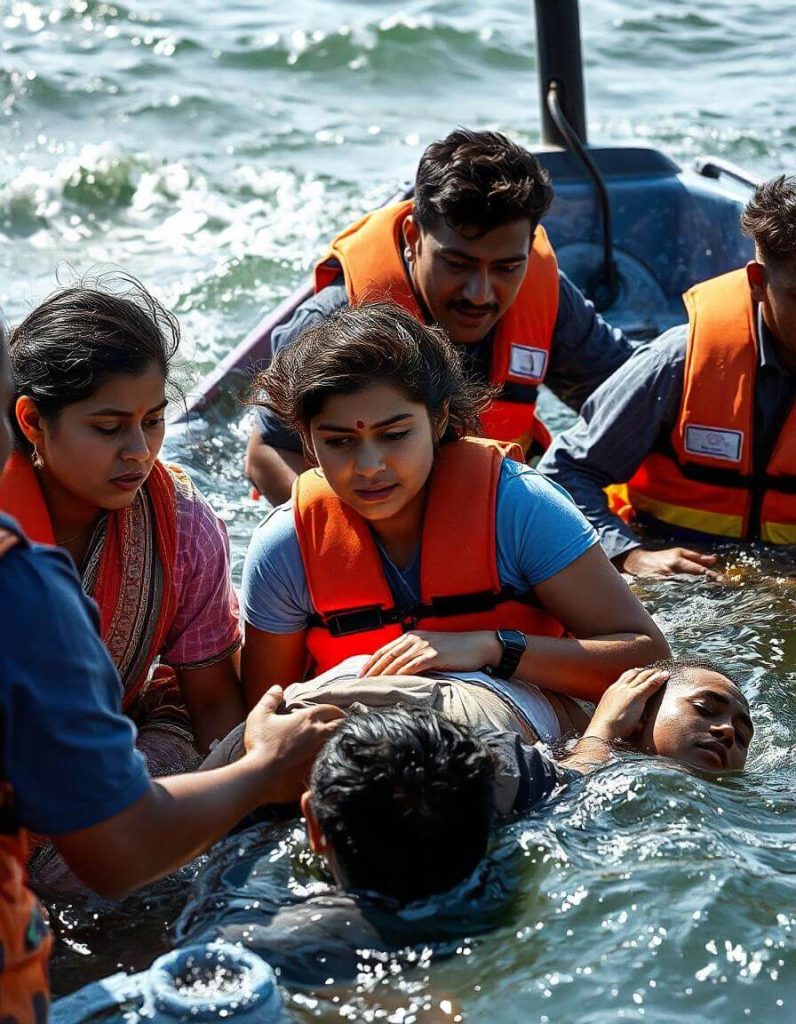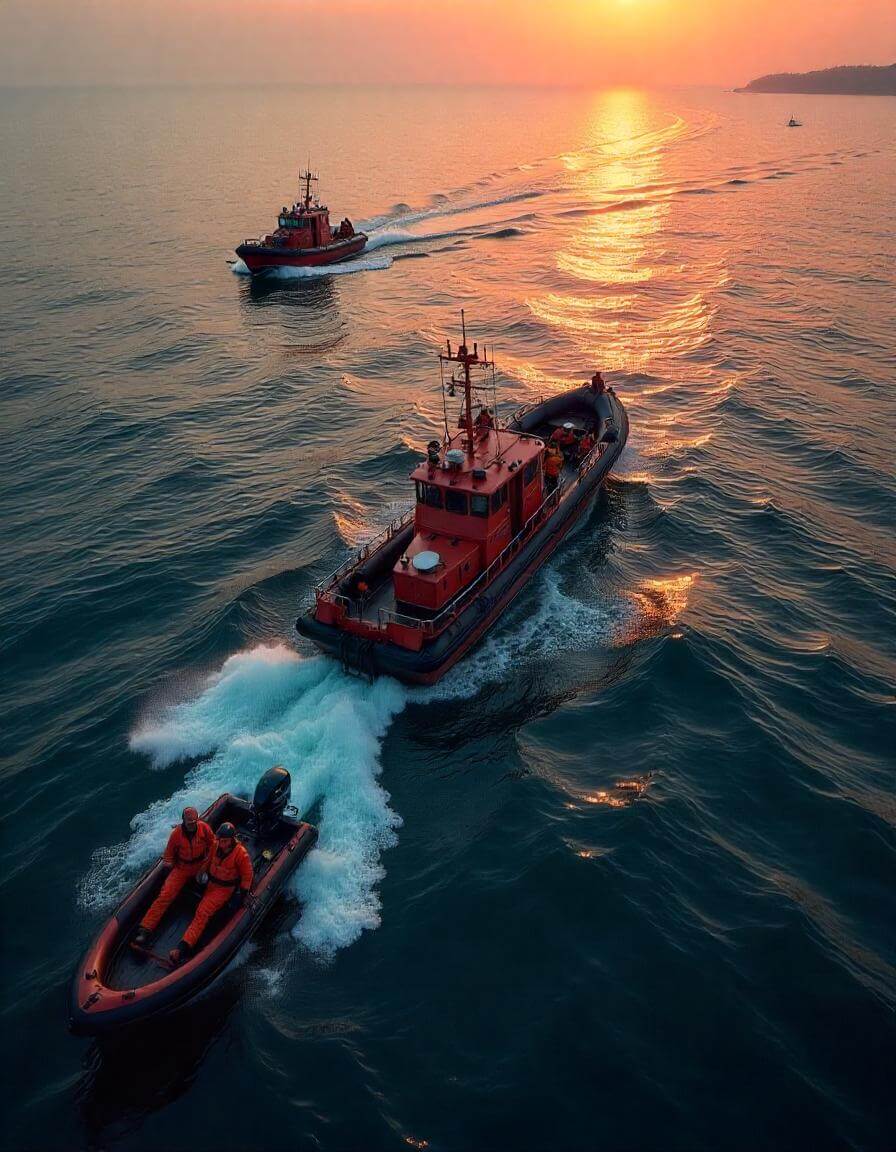On a tragic day that will be remembered by many, a ferry disaster off the coast of Mumbai resulted in a challenging and distressing rescue mission, marking one of the most arduous and poignant events in the city’s recent history. The event, which transpired during a standard ferry voyage, resulted in multiple fatalities and numerous injuries. First responders, comprising police, coast guard, and local fisherman, faced the most formidable challenge of their careers as they hurried to rescue individuals trapped in the tumultuous waters.
An first responder, one of the first to arrive at the scene, recounted the pandemonium and carnage that ensued following the tragedy. The responder characterized the incident as “undoubtedly the most horrific rescue operation” they had ever encountered, providing firsthand insights into the difficulty, emotional strain, and bravery necessary to manage such a catastrophic event.
The Incident: A Sudden Deterioration
The ferry, transporting more than 100 passengers, was traveling from Mumbai to a nearby island when it faced turbulent waters. Eyewitness testimonies indicate that the vessel capsized due to unforeseen heavy seas. As the boat capsized, passengers were ejected into the sea, with numerous individuals grappling to swim as the vessel rapidly submerged. The alarming image of individuals desperately attempting to remain buoyant reverberated throughout the coastal region.
The first responder, a member of the rapid-response team, remembered arriving at the location shortly after getting the emergency call. The situation was characterized as chaotic, with the sea teeming with people, trash, and wrecks. The atmosphere was charged, as every second was critical for preserving life.
The Rescue Operation: Disorder and Organization
The primary responder indicated that a significant initial problem was evaluating the magnitude of the incident. Due to the multitude of individuals in the water, the team had to promptly prioritize their rescue operations. The effort was further hindered by severe weather conditions, including high currents and reduced visibility owing to the time of day.
Acquainted local fishermen hastened to provide assistance, while the coast guard dispatched its rescue vessels. The cooperation of local fisherman, law enforcement, and coast guard personnel was essential to the operation’s success, albeit the challenging conditions.
“We were unaware of the number remaining in the water.” The responder stated, “Individuals were battling to remain buoyant, some were ensnared in debris, while others were unresponsive.” “It was challenging to discern who was alive and who was not.” We needed to respond swiftly, although the water was perilous, and the circumstances were continually evolving.
The responders exerted considerable effort to rescue survivors from the ocean, frequently under arduous conditions. A multitude of victims were either unconscious or in a state of shock, rendering their rescue increasingly imperative. The team employed inflatable rafts and ropes to extricate anybody remaining in the water, with certain victims being hoisted aboard boats that were already at full capacity. Each minute was crucial, and as time elapsed, the challenge of distinguishing the alive from the deceased intensified.

Emotional and Physical Stress
The emotional burden of the rescue mission was substantial. The trauma experienced by first responders, due to witnessing numerous lives in jeopardy and the challenges of rescuing individuals from the ocean, had a significant impact. The respondent described instances in which they grappled with their emotions while witnessing families fragmented by the catastrophe.
“It was inconceivable to remain unperturbed.” Several survivors were vociferously seeking their loved ones. There were minors and senior citizens… The respondent conveyed that it was challenging to comprehend the situation. “There were instances of hope when we rescued individuals, but also instances of despair when we encountered someone who was unresponsive.”
The rescue teams encountered physical fatigue. The prolonged struggle against turbulent seas, maneuvering through debris, and safeguarding surviving exerted a significant strain on the responders. Despite the considerable emotional burden, they maintained concentration on the objective, collaborating effectively to save as many individuals as possible.
The Consequences: Contemplation and Mourning
As the rescue operation concluded, responders contemplated the enormity of the catastrophe. While numerous lives were preserved, the mortality rate was catastrophic. The ultimate death toll was considerable, leaving families around Mumbai to grieve the devastating loss of their relatives.
The first responder highlighted the emotional rehabilitation that would ensue for both the survivors and the rescuers. “It is not solely about rescuing individuals from the water; it also involves addressing the subsequent consequences.” They observed that the emotional and psychological impact of such situations is substantial. A significant number of survivors will necessitate psychological treatment, as will the first responders who observed the traumatic event.
The respondent emphasized the significance of preparing in such occurrences. It is essential to implement adequate safety measures, enhance training, and establish more effective rescue operations. Despite our efforts, this tragedy demonstrates that there is always potential for enhancement.
Anticipating the Future: Insights Gained
The Mumbai boat disaster, albeit terrible, has underscored the necessity of safety protocols in marine transport. Authorities have commenced an investigation into the incident’s causes, encompassing potential concerns over the vessel’s safety equipment, navigation, and passenger capacity. Public and commercial sector entities are anticipated to reassess existing processes to mitigate the occurrence of such tragedies in the future.
The catastrophe has profoundly impacted the first responders. The respondent continued, “It is an experience you will never forget.” “We exerted all possible efforts, yet the emotional burden lingers.” For the families who have lost loved ones, it is an irrevocable loss.
The Mumbai boat catastrophe highlights the vulnerability of life and the courage of individuals who jeopardize their safety to rescue others. The bravery and resolve of the first responders, notwithstanding the obstacles encountered, epitomize the genuine essence of heroism amid catastrophe.
If you are interested for more: Mumbai boat incident: the most terrible rescue operation,’ recounts initial responder Dow Plunges 1,100 Points, Marks Longest Losing Strock Since 1974

